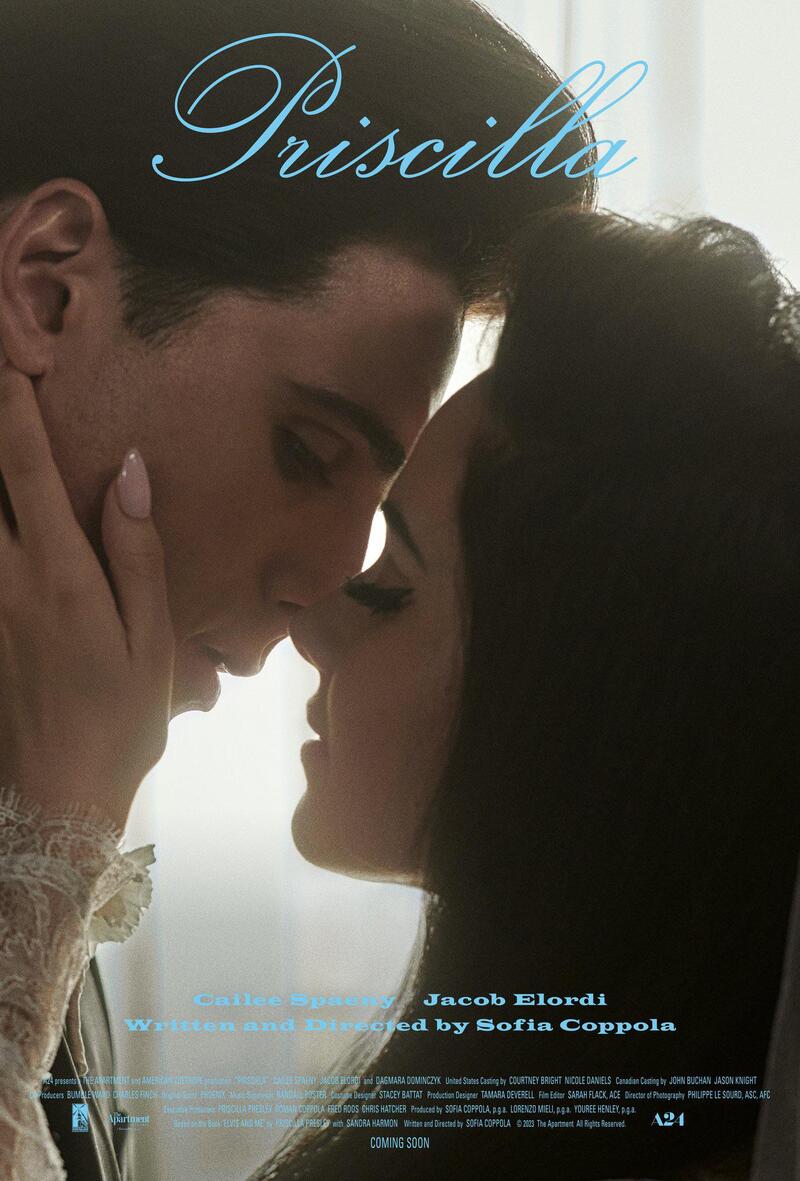
Review by
Eric Hillis
Directed by: Sofia Coppola
Starring: Cailee Spaeny, Jacob Elordi, Dagmara Domińczyk, Raine Monroe Boland, Emily Mitchell, Jorja Cadence,
Rodrigo Fernandez-Stoll, Luke Humphrey

Before the 1950s, the concept of the teenager didn't really exist. A
teenager was simply a young adult, expected to behave like a grown-up in
most ways but remain a child in some. Then, in America at least (my father
left a less liberated Ireland in the late 1950s at the age of 14 to
immediately begin working in a foreign country), came rock n roll, b-movies
and soda fountains. Suddenly teenagers were both seen and heard, adopted by
American marketers as a symbol of the nation's youthful pep. One of the key
figures in the establishment of the teenager was singer Elvis Presley, who
embodied youthful rebellion and scared old fogies with his hip movements.
Teens would have followed him over a cliff.
It's ironic then that one American teen who never really got to be a
teenager was Elvis's great love, Priscilla Presley, whom he began dating
when she was just 14. Using Priscilla Presley's autobiography 'Elvia and Me'
as a road map, Sofia Coppola details the ups and downs (and uppers
and downers) of Elvis and Priscilla's then barely remarkable but now highly
controversial relationship.

Though in her mid-twenties at the time of shooting, Cailee Spaeny is
remarkably convincing as the 14-year-old Priscilla Beaulieu we find at the
beginning of the film. Dressed like the girlfriend of the young hero of a
'50s b-movie, we find Priscilla sipping cola through a straw in a diner, the
very picture of American innocence. Priscilla is far from home though. She
lives in Germany, where her military father is stationed. The most famous
man in the world, a 24-year-old Elvis Presley (Jacob Elordi), is also
stationed there, having been drafted despite his fame.
When a member of Elvis's entourage spots Priscilla in said diner he invites
her to a gathering at the rock n roller's temporary home. Her parents ban
her from attending but they eventually give in to her protests. There
Priscilla finds not Elvis the icon but Elvis Presley, a rather awkward and
shy young man who charms her with his Southern gentleman patter and brings
her to near orgasm as soon as he starts belting out a tune on the
piano. The envy of every teenage girl in the world, Priscilla is invited to live
in Graceland with Elvis.

Coppola does an evocative job of portraying Graceland as a particularly
tacky prison, an overly gilded cage. With her lover away shooting movies
most of the time, Priscilla is left to wander its lonely corridors. The
emptiness of such an iconic American castle is reminiscent of the
post-assassination Camelot scenes in Pablo Larrain's
Jackie. Later, when Elvis's behaviour has turned toxic and threatening, the
empty rooms recall that montage at the end of John Carpenter's
Halloween
of all the now deserted rooms once stalked by a madman. Coppola's
Graceland is an off-season heartbreak hotel.
The production was unable to acquire the rights to use any of Elvis's
music, and it works in the movie's favour. This is after all, largely a
movie about the absence of Elvis. Even when present by Priscilla's side,
Elvis isn't really there. A reliance on drugs to keep him awake and put
him to sleep renders him an unreceptive zombie, and his old-fashioned
beliefs keep him from satisfying Priscilla's sexual desires.

In scenes reminiscent of Vertigo, Elvis fashions Priscilla into his ideal of how his lover should look,
controlling every aspect of her image like an abusive gay best friend
("You're a short girl, you gotta stay away from prints!"). Priscilla's
wardrobe plays a key role in the narrative as she increasingly defies her
eventual husband's wishes and sports the sort of outfits that might give
him a coronary. Coppola is as exacting as Elvis in how she focusses on
minute details of Priscilla's appearance, filling the screen with
close-ups of her painted toenails and fake eyelashes as the girl tries to
become a woman.
While it's far from hagiographic in its portrayal of the king of rock n
roll, Priscilla isn't the hatchet job many Elvis fans might
have feared. More so than any previous biopics, Coppola makes it clear
that Elvis's most toxic behaviour, which stops just short of physical
violence, is a symptom of his drug addiction. Elordi's Elvis is a Frankenstein's monster, and Coppola isn't
interested in offering him up to a torch-wielding mob. Just as Priscilla is a victim of Elvis, the superstar is himself a
prisoner of a highly controlled marketing campaign. Whenever he gets off
the phone with an unseen Colonel Tom Parker, Elordi seems to shed a foot
from his lanky frame. There have been better portrayals of Elvis the star,
but Elordi might be the first actor to really capture Elvis Presley the
boy, more preen and pout than twist and shout. This is a tale of two kids
who had their teen years stolen from them, pioneers who forged a path
through a jungle of celebrity that would consume many who followed
them.

